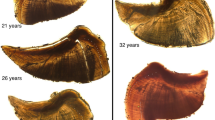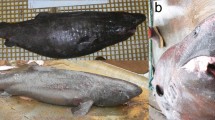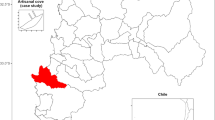Abstract
Iran’s marine capture fisheries is mostly small-scale. Due to data limitations they are difficult to manage. Given that fishers’ knowledge, in combination with scientific knowledge, could help to promote fisheries management in spite of these limitations, the present research aimed to understand the local knowledge that has not been fully recognized as a source for management decision-making. The paper reports from a study of small pelagic purse seine fisheries in the northern Persian Gulf and Oman Sea. The study area included three main fishing grounds of Sardines and Anchovy in Hormozgan province namely off Qeshm Island, Bandar Lengeh, and Bandar Jask. Data were drawn from 104 face-to-face interviews using a random sampling technique and then transcribed into the questionnaires. There was a strong positive correlation between age of the fishers and their fishing experience (P < 0.001, r2: 0.76, Spearman test). The interviewed fishers were often moderately to highly experienced. They informed that purse seining is a seasonal practice and the closed fishing season is determined by a collective decision among the fishers. According to the fishers’ statements, 10 factors affect the fishing performance, which locating fish schools had the highest priority. Fishers also asserted that fish abundance of the nearshores has decreased and they have to move to deeper waters. Accordingly, they have increased their boats engine power (to 200 hp) and the net size (length to 360 m and height to 36 m). Finally, the vast majority of the fishers complained about poor fisheries co-management, while they are willing to cooperate with the government. The present paper was the first attempt to document the fishers’ traditional knowledge in the region which could be fruitful for executives to update the decisions and fisheries management actions in the region.



Similar content being viewed by others
Data Availability
The datasets resulting from the current study are available from the corresponding author in the case of reasonable scientific request.
References
Allen IE, Seaman CA (2007) Likert scales and data analyses. Qual progress 40(7):64–65
Aswani S, Christie P, Muthiga NA, Mahon R, Primavera JH, Cramer LA, Barbier EB, Granek EF, Kennedy CJ, Wolanski E (2012) The way forward with ecosystem-based management in tropical contexts: reconciling with existing management systems. Mar Policy 36(1):1–10
Chuenpagdee R, Jentoft S (2015) Rethinking small-scale fisheries governance. Routledge Handbook of Ocean Resources and Management. Routledge, pp 241–254
Daliri M, Jentoft S, Kamrani E (2017) Illegal, unreported, and unregulated fisheries in the Hormuz Strait of Iran: how the small-scale Fisheries Guidelines can help. The small-scale Fisheries Guidelines. Springer, pp 557–572
Daliri M, Kamrani E, Jentoft S, Paighambari SY (2016) Why is illegal fishing occurring in the Persian Gulf? A case study from the Hormozgan province of Iran. Ocean & coastal management 120:127–134
Daliri M, Kamrani E, Salarpouri A, Ben-Hasan A (2021) The geographical expansion of Fisheries conceals the decline in the Mean Trophic Level of Iran’s catch. Ocean & Coastal Management 199:105411
Deepananda KA, Amarasinghe US, Jayasinghe-Mudalige UK (2015) Indigenous knowledge in the beach seine fisheries in Sri Lanka: an indispensable factor in community-based fisheries management. Mar Policy 57:69–77
Gammanpila M, Amarasinghe U, Wijeyaratne M (2016) Community-Based Management Strategies in The Brush Parks Fishery of Negombo Estuary, Sri Lanka. In proceedings of the 17th Conference on Postgraduate Research, International Postgraduate Research Conference 2016, Faculty of Graduate Studies, University of Kelaniya, Sri Lanka. 165P
Haggan N, Neis B, Baird IG (2007) Fishers’ knowledge in fisheries science and management
Hauck M (2008) Rethinking small-scale fisheries compliance. Mar Policy 32(4):635–642
Hilborn R, Sibert J (1988) Adaptive management of developing fisheries. Mar Policy 12(2):112–121
IFO (2020) Iranian Fisheries Yearbook for 2014 to 2019. Iran Fisheries Organization, Deputy of Planning and Resource Management, 64p
Jentoft S (2000) Legitimacy and disappointment in fisheries management. Mar Policy 24(2):141–148
Kamrani E, Daliri M, Jentoft S (2020) Promoting governability in small-scale capture fisheries in the Persian Gulf: the case of Qeshm Island. Iran J Fisheries Sci 19(6):2985–3000
Kurien J (2015) Voluntary guidelines for securing sustainable small-scale fisheries in the context of food security and poverty eradication: summary. In: International Collective in Support of Fishworkers
Mast A (2018) Bottom-up engagement increases marine protected area effectiveness master of Marine Management, Dalhousie University]. Halifax, p 78
McCay BJ, Jentoft S (1996) From the bottom up: participatory issues in fisheries management. Soc Nat Resour 9(3):237–250
Moradinasab A (2020) Ther report of Hormozgan’s marine capture fisheries in 2019. Hormozgan Fisheries Office, Statistics Department, Issue. S. Department, pp 1558–9153
Neis B, Felt LF, Headrich RL, Schneider DC (1999) An Interdisciplinary Method for Collecting and Integratin g Fishers’ Ecological Knowledge into Resource Management. In D. Newell, Ommer, R.E. (Ed.), Fishing Places, Fishing People (pp. 217)
Oliveira PDC, Di Beneditto APM, da Silva Quaresma V, Bastos AC, Zappes CA (2020) Traditional knowledge of fishers versus an environmental disaster from mining waste in Central Brazil. Mar Policy 120:104129
Paighambari SY, Daliri M (2012) The by-catch composition of shrimp trawl fisheries in Bushehr coastal waters, the northern Persian Gulf. J Persian Gulf 3(7):27–36
Pinello D, Gee J, Dimech M (2017) Handbook for fisheries socio-economic sample survey: Principles and practice. FAO fisheries and aquaculture technical paper(613), I
Plummer R, Crona B, Armitage DR, Olsson P, Tengö M, Yudina O (2012) Adaptive comanagement: a systematic review and analysis.Ecology and Society, 17(3)
Rafiee S (2020) industerial trawlers baning has entered the implementation phase
Ramires M, Clauzet M, Barrella W, Rotundo MM, Silvano RA, Begossi A (2015) Fishers’ knowledge about fish trophic interactions in the southeastern brazilian coast. J Ethnobiol Ethnomed 11(1):1–11
Saavedra-Díaz LM, Pomeroy R, Rosenberg AA (2016) Managing small-scale fisheries in Colombia. Maritime Stud 15(1):1–21
Salarpouri A (2022) Sardines and anchovies of the Persian Gulf and Oman Sea (Biology, Fishery, Processing). Iranian Fisheries Science Research Institute
Stanley D (2003) What do we know about social cohesion: The research perspective of the federal government’s social cohesion research network. Canadian Journal of Sociology/Cahiers canadiens de sociologie, 5–17
Stead S, Daw T, Gray T (2006) Uses of fishers’ knowledge in fisheries management. In: Berghahn Journals
Tejerina R, Hermida M, Faria G, Delgado J (2019) The purse-seine fishery for small pelagic fishes off the Madeira Archipelago. Afr J Mar Sci 41(4):373–383
van Reekum R, Stuss DT, Ostrander L (2005) Apathy: why care? J Neuropsychiatry Clin Neurosci 17(1):7–19
Williams BK (2011) Adaptive management of natural resources—framework and issues. J Environ Manage 92(5):1346–1353
Wilson DC, Raakjær J, Degnbol P (2006) Local ecological knowledge and practical fisheries management in the tropics: a policy brief. Mar Policy 30(6):794–801
Wood LJ, Boruff BJ, Smith HM (2013) When disaster strikes… how communities cope and adapt: a social capital perspective. change, 11, 12
Zack MH (1999) Managing codified knowledge. Sloan Manag Rev 40(4):45–58
Funding
This research was funded through the Mangrove Forest Research Center from University of Hormozgan and Persian Gulf and Oman Sea Ecological Research Center to the corresponding author.
Author information
Authors and Affiliations
Contributions
Conception and design of study: Moslem Daliri; Sampling: Moslem Daliri, Ali Salarpouri, Mohammad Momeni, Morteza Salahi; Acquisition of data: Moslem Daliri, Ali Salarpouri, Ehsan Kamrani, Analysis and interpretation of data: Moslem Daliri, Ali Salarpouri; Drafting the manuscript: Moslem Daliri, Svein Jentoft; Revising the manuscript critically for important intellectual content: Moslem Daliri, Svein Jentoft, Ali Salarpouri, Mostafa Zahirinia.
Corresponding author
Ethics declarations
Competing interests
The authors declare that they have no competing interests.
Additional information
Publisher’s Note
Springer Nature remains neutral with regard to jurisdictional claims in published maps and institutional affiliations.
Rights and permissions
Springer Nature or its licensor (e.g. a society or other partner) holds exclusive rights to this article under a publishing agreement with the author(s) or other rightsholder(s); author self-archiving of the accepted manuscript version of this article is solely governed by the terms of such publishing agreement and applicable law.
About this article
Cite this article
Daliri, M., Salarpouri, A., Kamrani, E. et al. Fishers’ Traditional Knowledge: A Primary Requirement for Adaptive Fisheries Management in the Northern Persian Gulf. Thalassas 39, 915–922 (2023). https://doi.org/10.1007/s41208-023-00542-9
Received:
Revised:
Accepted:
Published:
Issue Date:
DOI: https://doi.org/10.1007/s41208-023-00542-9




